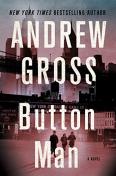
by Andrew Gross
Hardcover- $15.66
“Mr. Gross's direct style is full of sentiment but never maudlin and well-suited to scenes of violent action. Button Man has plenty of ...
Overall rating:
How would you rate this book?
Member ratings
Button Man: A Novel, Andrew Gross, author; Edoardo Ballerini, narrator
Morris Rabishevsky was just twelve years old when he decided he did not like school and wanted to learn a trade. He got a job, changed his name to Raab, and rose quickly in the garment industry, always watching and learning. At the age of twenty, he started his own company, Raab Bros. This part of the story is based on the life of the author’s grandfather, Fred Pomerantz who started the company Leslie Fay. Using his life as the back story, Gross has developed an interesting book about the rise of organized crime in New York City in the thirties. Morris Rabishevsky, the main character, lived through the ups and downs and all the trials and tribulations of criminal efforts to drive him and others out of business. Mobsters had their tentacles in all branches of the city government. Thomas Dewey was a prosecutor intent on driving them out of business.
Although “The Button Man” is a novel, it traces the history of Jewish immigrants from Russia who settled on the Lower East Side and struggled to survive. Although qualified for other work, they were often forced to take more menial jobs because of prejudice and language issues. As they assimilated, they began to invest in an industry available to them, and they soon created what was to become the garment center. As they prospered, so did the illegal behavior of others who saw an easy opportunity to milk the industry and control it with muscle and threats. Organized crime was on the rise. Murder Incorporated, dubbed as the Jewish Mafia, rose in power alongside the Italian Mafia. Often, the Mafia called on Murder Incorporated to take care of some of their more heinous deeds, as they were supposed to be more willing to perform brutal acts.
For me, the book was very nostalgic. I grew up in Brooklyn and am still familiar with the streets and the names of the people involved. Although organized crime was on the rise before I was born, its memory lingered in Brooklyn in many ways. For instance, as a young teenager, I was aware of the fact that there was another teenager who lived a block or so away from me, who had changed her name. It turns out, after reading this book, and doing my own research, that Marilyn Korsh, the girl I passed in the street on my way to school, was indeed the daughter of Abe Reles. He was a monstrous murderer who operated within the bounds of Murder Incorporated as the chief henchman. I grew up believing he was tossed from a window to his death, but apparently his death was ruled an accident occurring as he attempted to escape. Of course, knowing how corruption reigned in the police force in the New York City area, at that time, and also knowing about the brutality of rival gangs within the mobs, I still do believe that he was murdered for providing evidence against them to save his own skin.
From the book I learned that Murder Incorporated, run by Jewish gangsters, and the Mafia run by Italians, had collaborated. I had not realized that the garment worker’s unions were originally started to make the mobsters rich, not to protect the workers. The Jewish mob, formed by notorious Jewish-American gangsters Meyer Lansky and Benjamin "Bugsy" Siegel, and run by Louis “Lepke” Buchalter, used more and more brutal methods of coercion to force businesses to join them. Those who resisted and refused to enlist the mob, or refused to pay them protection money or use their vendors at higher prices, were attacked and their inventories were destroyed. Ultimately, there was violence and their businesses went under, if they did not comply. Fear was used to control those involved.
Gross portrays the Jewish mob as even more vicious than the Mafia mob. According to him the Mafia came to Murder Incorporated when a particularly heinous job came up. They used Louis Buchalter, a violent man, to carry out their orders of brutality. He had no compunction about doing anything. To him, it was important for the mob to appear untouchable. Both the Mafia and Murder Incorporated had a finger in government, the police department, and any other sphere of influence they could reach. They threatened anyone who turned against them and paid off informants with huge sums of money. The choice was to take the money or we take your life. They were effectively in charge until Thomas Dewey, a prosecutor who went on to become Governor and run for President, mounted an effort to destroy them.
Mob violence is a blight on our history and this book, which has something for everyone to identify with, shines a light on all those things. Family dynamics, loyalty, love and loss all appear on the pages alongside the crime and violence.
Book Club HQ to over 90,000+ book clubs and ready to welcome yours.
Get free weekly updates on top club picks, book giveaways, author events and more








